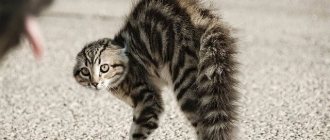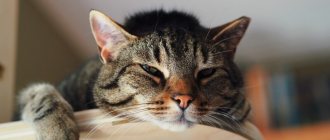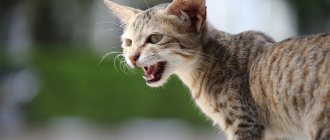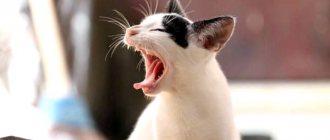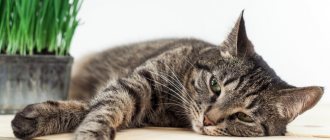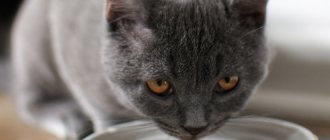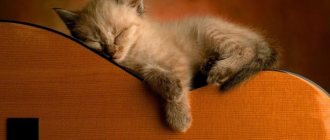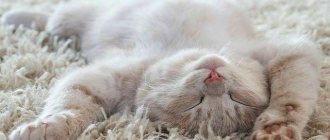Many cat owners have heard their pet make these strange, either chirping or clicking sounds, very reminiscent of grinding teeth.
This happens when a cat sees potential prey outside the window and cannot reach it, which undoubtedly serves as a sign of its disappointment or excitement from a failed hunt. This happens much less often at the sight of food. It also happens in a dream.
But what is much less harmless is if this happens while eating, because it is usually associated with some kind of pathology, and can continue permanently, unless the animal’s teeth are incorrectly positioned.
Cat sounds are more varied than they seem.
Everyone knows that cats purr and meow. We learn about this in early childhood. However, the auditory signals given by a cat are much more varied and complex. The cat growls, grunts, snorts, hisses, howls.
Even a simple meow takes different forms depending on the emotions that the animal is experiencing at the moment. However, you should not think that the sounds of cats are only a reflection of the mood of our pets. They perform another important function: they serve for communication. So if you know their meaning, talking to your cat will be much easier.
Photo: Pixabay
Reasons: why does a cat chatter his jaw?
Traumatic injuries
If your cat has pain in chewing or refuses to eat at all, this may be a symptom of a jaw injury. Typically, a dislocation of the mandibular joint or a closed fracture is diagnosed if the articular ligament is stretched or torn. Bones crunch when trying to open the mouth, saliva flows, the animal cannot eat or eats reluctantly, smacks its lips while eating, and there is pronounced deformation and asymmetry of the muzzle. The cat also clicks its jaw due to a traumatic brain injury. Cause:
- falling from height;
- hitting your head or muzzle on a heavy object during play;
- traumatic injuries of the spine;
- auto injury.
Return to contents
Infectious diseases
Tetanus (tetanus)
The causative agent is the tetanus bacillus. However, cats are resistant to the microorganism and rarely suffer from tetanus. More common in kittens or older animals due to immature or weakened immunity. Infection occurs through a puncture or cut wound with an object on which the bacteria is present. Once in the cat's body, the microbe releases a strong toxin that affects the nervous system. If a cat grinds its teeth, this is the first symptom of the disease, since at the initial stage the toxin affects the jaw muscles. Then strong convulsions of the whole body are observed, the cat gasps for air. The disease is fatal due to spasm of the heart muscles.
Osteomyelitis
The disease is characterized by bacterial inflammation of the jaw tissue - periosteum, bone body, bone marrow. A kitten can get sick when changing teeth if the wound gets infected. The cat refuses to eat and play, its temperature rises, its breathing and heart rate are disrupted, and its lymph nodes become enlarged. The disease develops due to the following factors:
- chronic diseases in the cat’s mouth (gingivitis, stomatitis, periodontal disease);
- injuries to the jaw and penetration of microbes into the wound;
- autoimmune failure;
- sepsis;
- incorrectly performed hygienic or surgical procedures in the oral cavity.
Return to contents
Rabies
A deadly disease caused by the Rabies virus. The microorganism spreads through the nervous tissue and reaches the spinal cord and brain, causing irreversible dysfunction. The cat grinds its teeth, develops aggression and anxiety, cramps of all muscles of the body, drooling, photophobia, poor coordination of movements, panic fear of water (the animal refuses to drink). Infection occurs when a sick animal bites or licks a healthy animal.
Non-communicable diseases
Uremic gastritis
The disease occurs against the background of renal pathologies - urolithiasis, pyelonephritis, renal failure. Protein metabolism in the body is disrupted, and urea levels increase. This causes the stomach lining to become irritated as toxins accumulate in the gastric juices. With the bloodstream, urea and bile acids enter the tissues of the oral cavity, causing itching in the gums. To get rid of it, the cat clenches its jaws, and due to the effects of uric acid salts, tooth enamel is destroyed, causing the teeth to grind when the animal eats.
Worm infestation
If a cat crunches its teeth and jaw when chewing, this indicates infection with roundworms, tapeworm, hookworm, and toxocara. Worms cause abdominal pain, bloating, and nausea, which causes the pet to reflexively clench its jaw. In addition, parasites manifest themselves as intestinal upset, loss of appetite, decreased immunity, and dull coat. Routes of infection:
- licking helminth eggs from the paws while washing, if the pet visits the street;
- drinking contaminated water;
- eating raw meat of an infected animal and fish;
- presence of fleas on the animal.
Return to contents
Meowing, purring and other “normal” cat sounds.
You may come across the statement that cats meow only to people. This is not true, since pets also make this sound when communicating with other cats.
However, when dealing with people, they meow in a certain way. In this case, the cat's sounds take on a slightly whiny and pleading tone. A crying cat is not surprising, because this is how animals want to get your attention and get something.
Besides meowing, the most famous cat sound is purring. However, contrary to stereotypes, cats do not purr only when they are happy. It is believed that this sound simply indicates the need for close contact.
Cat speech also consists of growls, buzzing and screams that accompany aggressive behavior. Animals also hiss and snort. A cat's snort is an attempt to scare off a stronger enemy.
3. The cat makes strange sounds.
To be fair, the terms “normal cat noise” and “weird cat noise” are arbitrary. For our pets they are all completely ordinary. However, to the human ear, some of them may indeed sound surprising. Especially if you don’t have much experience working with cats yet.
What are cat noises and what do they mean? From all their variety, you can choose a few specific ones. The ones that might surprise you. Then let's get to know them.
- Cat sounds - barking.
Barking is probably the strangest cat noise owners hear, and perhaps the least understood. Some call it chattering or clicking, and furry ones most often make it when they're sitting on a windowsill, looking through the glass at the birds bouncing outside the window.
Barking occurs when our purring friend moves his jaws rhythmically and quickly. And it does sound a bit like dogs barking, but can also be associated with chattering teeth.
This amazing cat sound is interpreted as an expression of excitement caused by the sight of potential prey - their eyes are eager to hunt birds. At the same time, this can be considered a sign of disappointment, since the potential victim is out of reach of the furry ones.
Behaviorists consider this barking to be a deliberate movement. This is a term used to describe the behavior of animals that reveal their intentions. In this case we are talking about catching and killing a bird. Cats kill their victims with a quick and powerful bite to the neck, which breaks the spinal cord in the cervical region. Seeing a potential victim, but unable to reach it, the cat makes a death motion, as if imagining itself doing so.
However, our pets also bark in other situations. For example, when an animal sees us when we put food on a plate and wants us to share it. Sometimes we hear this cat sound when the pet is angry.
- Cat sounds - chirping.
Chirping occurs in situations similar to barking, that is, when your pet is watching for out-of-reach prey. Purring pets also chirp when something intriguing appears in their eyes. These may be objects or sounds that the animal somehow associates with its prey or food. So this cat sound has the same meaning as barking.
A cat's chirping sounds a bit like birdsong or rodent squeals, hence its name. There is a claim that the cat's sound was an imitation of the sounds made by rodents and birds. Of course, there can be no question of deliberate imitation.
- Cat sounds - cooing.
Another one on the list of the strangest cat sounds, it is sometimes called trilling - from the English word "thrilling". However, I prefer the more familiar name "cooing". Moreover, this element of a cat’s language really resembles the cooing of pigeons. When cats croak, they often rub against objects, furniture, people or other animals.
Cats coo at both people and other animals with whom they are friends. Cats very often use this sound in contact with their children.
Trilling is one of the cat's signals for expressing positive emotions. You can consider it as one of the elements of the greeting ritual of cats, because they often use it when greeting. It means both joy from the return of the owner or meeting a friendly pet, as well as friendly intentions towards them.
Often cats just coo because they feel good. Or that they are happy in the company of a person or other animal.
In some situations, cooing can be interpreted as a request for attention or as a request for contact, such as affection. Thus, many cats try to convince their owner to follow them when they want to show him something - for example, an empty bowl.
- Cat sounds - singing.
Another strange cat noise. It can be heard mainly performed by unsterilized cats. An inexperienced cat lover may be very surprised when he first encounters one. She may even worry about the health of her ward, because the female also behaves strangely while singing.
Cat singing is an emotional, pathetic call with elements of meowing, cooing and howling. This cat sound is long and swift. It often ends with a loud, guttural howl that seems to come from the cat's guts—when the cat emits it, she sharply sucks in her stomach.
Cats sing in heat. Thus, they announce to the whole world that they are ready to give birth to kittens, and attract potential fathers of their future children. Males who sense that a female is in heat may also sing. In their performance it sounds a little more aggressive. This is how they try to attract the attention of cats.
To be honest, it is not known why someone once called this cat sound singing. This is not very pleasant to the human ear. It can be almost unbearable.
- Cat sounds - squeaking.
Squeaking is also a slightly scary cat noise. This is a modified version of the classic cat meow. Although it sounds sharper. We may get the impression that our pet is hoarse or has a dry throat. The sound produced may be short, intermittent, or long.
Cats use this sound when communicating with people. Creaking most often means that our four-legged student wants something from us or wants to attract our attention. So this cat sound is kind of a question.
- Cat sounds - squeaking.
The squeak of another cat can be considered a brighter and higher form of ordinary meow. It is used by kittens when, for various reasons, they need help from their mother. For example, when they are hungry or feel lost. When a cat hears this cry of her offspring, she immediately runs to him.
Typically, domestic cats, even adults, treat their owners to some extent as their mother. This is why they often treat them like kittens. It's no surprise that adult cats sometimes squeal at people. This happens when they need it, when they feel lonely or afraid of something.
- Cat sounds - moaning.
Moans are a crying and sad version of a regular meow. It also sounds like a more emotional version of a squeak. It sounds darker, deeper. Cat noises such as moaning and squeaking can be heard when a purring pet is feeling lost, unhappy and depressed. Animals may also moan when something is wrong with them - they are in pain or are sick.
A crying cat has a strong influence on the emotions of its owners. This may be because these cat signals are strongly associated with crying in human babies.
Other signs to watch for and how to help
If you see your cat smacking its lips, we recommend the following:
- Look at your cat's general behavior and attitude and determine if there is an underlying health problem.
- Assess your cat's behavior. Is your cat nervous? Anxious? Scary? Try to determine whether lip smacking is a way of expressing anxiety. If your cat is in a situation that you think might make her uncomfortable, this could be a sign of displacement. You can help your cat by eliminating stressors and enriching the environment.
- Determine if it is a health problem. It is best to take your cat to a veterinarian. They may also want to know when lip smacking occurs? Is this permanent? Is this new? Only after eating? Does this happen when your cat is anxious or nervous? They will likely want to examine the skin around the face, lips, gums, teeth, and perform a full oral examination. Your veterinarian will also look for any foreign bodies in the mouth, dental disease, and mouth ulcers. Finally, they will need a detailed history of your cat's diet, food changes, exposure to debris or toxins, general appetite, vomiting, diarrhea, lethargy, and weight loss.
Article author: Dr. Debra Primovic.
Grinding of teeth, nausea or vomiting in a cat
Sometimes the grinding is accompanied by other unpleasant symptoms. If a cat is sick or vomiting, then these symptoms may indicate the presence of parasites in the pet’s body, diarrhea or constipation develops, appetite worsens, and body weight decreases.
A cat burps and grinds its teeth if it suffers from uremic gastritis or liver diseases.
The animal eats poorly and often makes chewing movements.
Additional symptoms include:
- general weakness;
- urinary disturbance;
- bad breath.
The animal vomits when kidney problems develop. Such pathologies are accompanied by frequent urination, nausea, lethargy and apathy.
Causes of pathology during sleep
An animal may also grind its teeth in a dream. Usually this condition is a consequence of a stressful situation experienced. After nervous shock, a cat's jaw may clench when it sleeps.
This phenomenon in veterinary medicine is called stress bruxism.
Another reason is the pet’s recovery from anesthesia after surgery.
A cat grinds its teeth in its sleep due to helminthic infestation. If parasites in the animal’s body are activated, then these signs become more intense.
